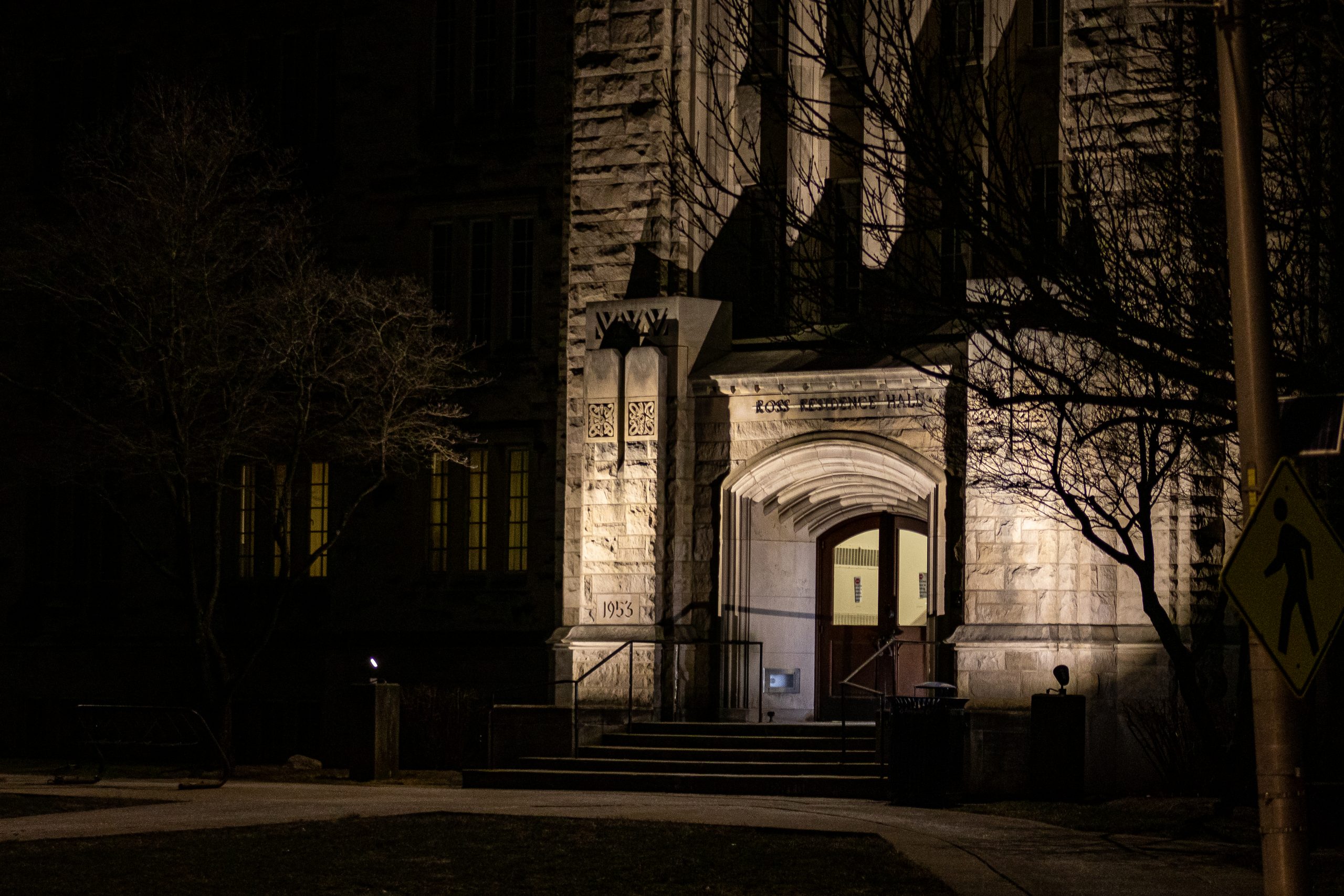Ross Hall was originally set to be demolished in 2018, but is now used as a space for students to isolate themselves. Photo by Ben Caylor.
GENEVIEVE KARUTZ | OPINION COLUMNIST | gkarutz@butler.edu
When Kenzie Call, first-year exploratory major, received a positive COVID-19 PCR test result off-campus, she contacted Health Services and was instructed to isolate in Ross Hall as soon as possible.
“I thought [Ross] was going to be the worst experience of my entire life, purely just based on rumors I heard about it,” Call said.
Ross is rumored to be a depressing, practically abandoned dorm that was built in 1954. And it has — gasp! — communal bathrooms. It currently serves as the location where students isolate if they test positive for COVID-19. Although I have not been in isolation, I imagine that isolating in Ross must feel like jumping into a black hole. Once you go in, you are all alone and might never come out.
Now, being alone can have its perks. You don’t have to deal with an annoying roommate, you can be more productive, and most importantly, you can cry without judgment to cringy Netflix movies.
Although I appreciate having alone time now and then, being alone for days on end is a completely different story.
Call thinks that being a social butterfly made isolation even more difficult. She also feels the administration could have done a better job of helping students feel less alone, and despite isolating at the same time as her roommate, Call struggled.
“I get really sad and depressed when I am alone,” Call said. “There wasn’t anyone at the front desk. There wasn’t anyone making sure [my roommate and I] were okay. We felt really alone.”
But Call was definitely not alone in her belief that isolation in Ross is difficult.
Korah De Lion, first-year instrumental music education major, struggled with being on her own for five days when she tested positive for COVID-19. One of her biggest challenges was finding ways to kill time during isolation.
“Beforehand, I just didn’t realize there’s literally nothing to do if you’re not in class,” De Lion said.
While I personally have never quarantined in Ross, I imagine such a sudden separation from the Butler community can be incredibly jarring and difficult to adjust to.
De Lion said that it can get very boring in Ross after quarantining for several days, and she would recommend that others bring some type of instruments, video games or anything that would help keep them entertained.
Though some of these items may seem obvious, students sentenced to quarantine only have around 30 minutes to pack for Ross, and it can be good for others to have an idea of what they would bring just in case.
Besides the difficulties when it comes to being bored and alone, some students have had other issues in regards to quarantine.
After she moved into Ross Hall, sophomore marketing major Isa Sanchez felt lost.
She was surprised by how difficult it was to get into contact with Health Services. Sanchez’s friend was in isolation at the same time and was suffering from severe symptoms, such as having trouble breathing. Sanchez worried about her friend’s well-being since Health Services could take hours to get back to students.
If a student is in dire need of help due to symptoms, they should contact BUPD emergency which is stated in every quarantining student’s COVID-19 isolation packet.
It is totally understandable how students could have trouble in regards to understanding the quarantine packet. It can be overwhelming, especially on top of the amount of stress that quarantining can cause. I recommended to anyone who is in Ross to read the packet carefully to be prepared in case of an emergency.
Sadly, Sanchez encountered additional communication delays on her last day of isolation. She did not receive the much-anticipated call that would enable her to finally leave Ross until 9 p.m. that night.
I understand that the administration is doing everything they can. I genuinely think the administration has done a good job handling the pandemic, but I believe they need to do a better job at providing resources for students in isolation — especially mental health resources.
Students are sent a survey every day while at Ross to monitor their symptoms and overall feelings about their quarantining situation. Furthermore, students are encouraged to reach out to Counseling and Consultation Services or The Center for Faith and Vocation, but that is simply not enough in regards to students’ mental health. More efforts should be made by the administration to require mental health check-ins over zoom with isolated students, because many students may be hesitant to reach out for help.
Overall, quarantine is always going to be a difficult time, whether it be in Ross or anywhere else. Unfortunately, it’s inevitable — as long as the pandemic continues, students will have to isolate themselves when testing positive for COVID-19.
For anyone who may be quarantining now or in the future, remember the importance of self-care and remember you are never alone. There are many people around the world quarantining at the same time you are. Asking for help is okay. Whether it’s calling a friend to rant or contacting CCS to speak with a professional, your thoughts and feelings are valid.
Until the day we no longer have to quarantine, we need to support students in isolation and recognize that undergoing psychological stress can be just as hard as the physical symptoms of COVID-19.



